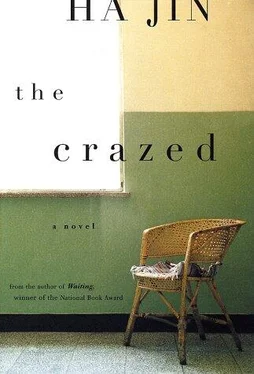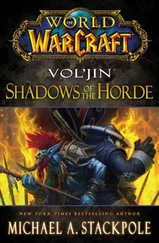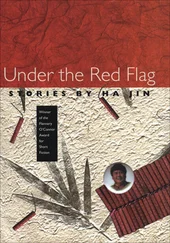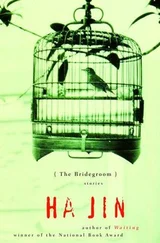Mrs. Yang muttered, “She’s totally spoiled.”
“You could have chosen a sweeter piece,” added her father.
Meimei sat down without a word, panting a little. My mother picked up the envelope and put it back into the inner pocket of her jacket. She said, “Meimei, I’ll keep this money for you. Whenever you need it, it’s yours.”
I was unhappy with Meimei. If she had accepted the woolen coat from my parents, why couldn’t she take the money? What made her so particular? But I didn’t say anything to reopen the topic.
The Yangs’ apartment had just one bedroom, so my parents stayed with me in the dormitory. Huran and Mantao had gone home for the winter break, and there were enough beds, though my parents had to sleep separately. That they didn’t mind. But they were accustomed to the heated brick-bed back home, the beds here were too cold for them, and they complained that there was no stove in the room.
The day before my parents returned home, Meimei, Mrs. Yang, and my mother went shopping downtown. My parents wanted to take back some fashionable clothes for friends and neighbors and also some fancy candies for children, which were not available at our local grocery stores. My mother was fond of Meimei despite my fiancée’s unsteady temper, often saying it was fortunate to have a doctor in our family. At those words, Meimei would smile complacently and declare she’d handle me like a doctor treating a patient. She even warned me to expect a fishwife.
My father and Mr. Yang stayed home, smoking pipes while chatting away over black tea. They liked each other very much. My father had been a college graduate and was well read, so they had a lot to talk about. I sat in the bedroom, listening to them through the door ajar.
“Old Wan, you must have gone through a great deal of hardship all these years,” said Mr. Yang.
“That’s true,” my father admitted. “Look at my hands, they’re coarser than a peasant’s. I used to write articles for a major newspaper in Tianjin. Just because of a few words of criticism about an overbearing leader, they sent me to Heilongjiang Province to be reformed.”
“Did you often starve at the labor camp?”
“I didn’t go to a camp actually. What happened was that before the revolution my father had been a landowner, a small one who had only five acres of land. But he helped the Communists during the war against the Japanese invaders and often gave them food and shelter, so during the Land Reform the Communists put him into a different category from a regular landowner. He was classified in ‘the open-minded gentry.’ ”
“Does this mean you’re from a revolutionary family?” Mr. Yang asked in earnest.
“No, we were treated as a lesser kind of reactionary. Some of the Communists still remembered my father when I was in trouble, so they intervened on my behalf. That’s how I wasn’t sent to a camp. Else God knows where my bones would’ve been scattered.”
“I see,” sighed Mr. Yang. “There has been so much gratuitous suffering in our lives.”
I peeked in at them. My father’s face grew more rugged, his little nose twitching. “My family suffered a lot because of me too,” he went on. “Jian and his brother often got beaten up on the streets. One evening I was released by the revolutionaries and returned home, only to find that my boys both had swollen faces and broken skulls. Jian still has a scar above his eye.”
True, my right eye would still blur a little in sunlight, owing to a stone a boy had thrown at me when they kicked and slapped me outside the elementary school. After that beating, for a week, my right eye could hardly distinguish two from three fingers put before my face, but later my mother fed me cod-liver oil every day and gradually my vision was restored.
Mr. Yang said, “No wonder Jian often seems sad and gloomy like an older man.”
“For many years he didn’t have any friends except for his younger brother. I was terribly worried about him and afraid he might be traumatized. He was more withdrawn than my other son. I wondered if he’d lost the ability to smile, but after he went to college, he seemed to become more open.”
“He gets along with others well here, he’s a fine young man.”
“Now with Meimei, he should be all right.” Father laughed.
“You have raised him well, Old Wan.”
“I would say so too. I often did homework with him and the younger one together.”
More than that, my father had also told stories and recited classical poetry to us. With his help, I had memorized many poems. That was the origin of my love for literature. In every way he was a devoted family man; my brother and I often slept with him so that we could hear him tell us folk tales. Although my mother, from a local peasant family, was almost illiterate, he had always treated her with respect and gratitude for her loyalty and endurance. She had seldom complained about the humiliation and hardship we had gone through. She was a strong woman and for many years had driven a mule cart selling tofu on the streets, which was the only job she could get. Her rawboned face often reminded me of that painful period of our life.
My father had dexterous hands. Several times the tree farm’s leaders had wanted to transfer him to its propaganda section, but he refused to go, saying he couldn’t write anymore and preferred to remain a carpenter. He was well respected for his craftsmanship, and so many people wanted him to make wardrobes, chests, and dining tables for them that he always had his hands full. He told Mr. and Mrs. Yang that when they had a more spacious apartment, he’d like to come and build some furniture for them. If they couldn’t get lumber here, he could send them some before he came.
Gradually the two men began talking about poetry. My father was no expert in poetics, but he knew many of Tu Fu’s poems by heart. Mr. Yang got excited as they went on. They both loved the later Tu Fu more than his early work, believing it represented the peak of classical Chinese literature.
“It’s poverty that refined his poetry,” remarked my father, repeating the cliché, but with genuine feeling.
“Well, for many years I thought that way too,” said Mr. Yang.
“You don’t think so anymore?” my father pressed on.
“Honestly, I’m not sure.”
“How come?”
“Two years ago I went to a conference in Chengdu, so I had an opportunity to visit ‘the straw hut’ where Tu Fu spent his last years. Believe it or not, it’s not a hut but a big house, much bigger than a regular cottage. Before the house there were flowerbeds filled with chrysanthemums and roses of various colors. The yard was so large that it took me a few minutes to walk across. His residence was more like a wealthy landowner’s. Tu Fu seemed well provided for in his last years. He had powerful friends who gave him money and provisions.”
“But didn’t he starve to death?”
“That’s a legend without any proof. The belief that he lived in dire poverty could just be a sentimental invention, meant to comfort poor scholars and intellectuals like us. Frankly, I don’t see much connection between poverty and the refinement of poetry. I dare say that Tu Fu might have had a better life than many of us.”
“That’s very interesting.” My father sounded dubious, but said no more.
Mr. Yang added, “In Chinese history, this must be the toughest time for us intellectuals. So many lives have been wasted and so many talents destroyed. In addition to material poverty, there’s spiritual sterility too.”
They both turned silent.
In class Mr. Yang would never speak so candidly. His remarks indicated that he had reservations about some of the comments in our textbooks. The notion that poverty can refine poetry is a principle in the conventional poetics, but according to my teacher, this idea could be erroneous. Probably, I thought, I should write a paper on this subject if he doesn’t dare to do it himself. Later I brought this up with Mr. Yang, but he told me to forget about it.
Читать дальше

![Lao Zi - Dao De Jing [Tao Te Ching] (english)](/books/3890/lao-zi-dao-de-jing-tao-te-ching-english-thumb.webp)
![Lao Zi - Dao De Jing [Tao Te Ching] (chinese)](/books/3891/lao-zi-dao-de-jing-tao-te-ching-chinese-thumb.webp)
![Lao Zi - Dao De Jing [Tao Te Ching] (espanol)](/books/3892/lao-zi-dao-de-jing-tao-te-ching-espanol-thumb.webp)







